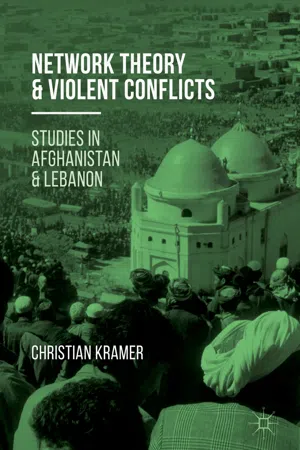
Network Theory and Violent Conflicts
Studies in Afghanistan and Lebanon
- English
- PDF
- Available on iOS & Android
About this book
This book offers a novel approach to understanding violence and violent conflict using complexity and network theories, borrowed from the natural sciences, together with social network analysis. Because violence is both a universal and central component of human communication and identity formation, it has a fundamental function in shaping social behavior. Using Manuel Castells' work on the programming of social networks, this book explores the Lebanese Civil War and the ongoing war in Afghanistan under the perspective of violence within networks. The approach presents a unique and compelling argument that counters the long-held assumption that war is caused by specific events, or is the unavoidable culmination of existing conditions or grievances. Rather, this book argues that violence emerges when the structure of social networks becomes too rigid and hierarchic to adapt to stresses and challenges that materialize on a constant basis from both within and without the network. This is important not only for the study of war, but as a method of improving the success of contemporary peace building efforts.
Frequently asked questions
- Essential is ideal for learners and professionals who enjoy exploring a wide range of subjects. Access the Essential Library with 800,000+ trusted titles and best-sellers across business, personal growth, and the humanities. Includes unlimited reading time and Standard Read Aloud voice.
- Complete: Perfect for advanced learners and researchers needing full, unrestricted access. Unlock 1.4M+ books across hundreds of subjects, including academic and specialized titles. The Complete Plan also includes advanced features like Premium Read Aloud and Research Assistant.
Please note we cannot support devices running on iOS 13 and Android 7 or earlier. Learn more about using the app.
Information
Table of contents
- Contents
- Chapter 1: Introduction
- Chapter 2: Networks, Complexity and International Relations
- Chapter 3: Networks and Violence
- Chapter 4: Disintegrative Violence
- Chapter 5: Lebanon
- Chapter 6: Afghanistan
- Chapter 7: Network-centric Peacebuilding
- Index